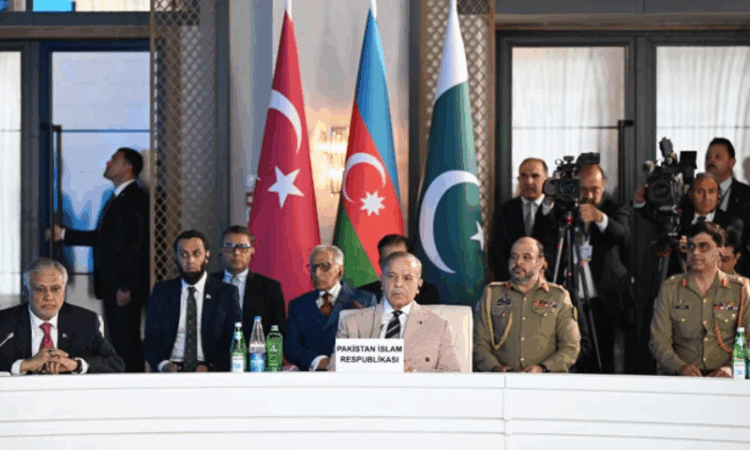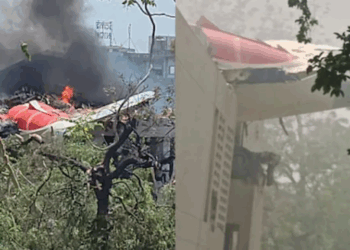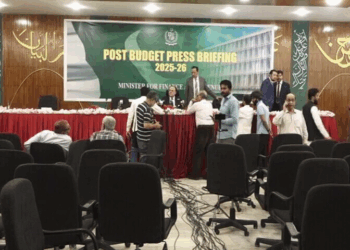Baku, May 28, 2025Prime Minister Shehbaz Sharif has once again urged India to engage in dialogue to resolve longstanding disputes and ensure lasting peace in South Asia. Speaking at the Pakistan-Turkiye-Azerbaijan Trilateral Summit in Baku, the premier emphasized the need to address critical issues such as Kashmir, water resources, and terrorism through constructive engagement.
“We must sit together and talk for the sake of peace,” said PM Shehbaz, addressing the summit alongside Turkish President Recep Tayyip Erdogan and Azerbaijani President Ilham Aliyev. “There are matters that demand urgent attention, and these must be resolved through dialogue.”
The summit is part of PM Shehbaz’s ongoing four-nation diplomatic tour aimed at thanking allies for their support during Pakistan’s recent military standoff with India. After completing visits to Iran and Turkiye, the Prime Minister arrived in Azerbaijan and is scheduled to proceed to Tajikistan.
Reaffirming Pakistan’s commitment to peace
During his address, PM Shehbaz reiterated Pakistan’s long-standing commitment to regional peace. “We desired peace yesterday, we desire peace today, and we will continue to desire peace tomorrow,” he said.
He called for a resolution of the Kashmir dispute in accordance with United Nations Security Council (UNSC) resolutions and the aspirations of the Kashmiri people. He also expressed Pakistan’s willingness to hold counterterrorism talks with India—provided New Delhi demonstrates sincerity.
Highlighting India’s recent military aggression, the Prime Minister said Pakistan emerged resilient due to divine blessings, public support, steadfast allies, and the professional resolve of the armed forces. “India tried to weaponize the Indus Waters Treaty—Pakistan’s lifeline for 240 million people—but we will ensure it never succeeds,” he stated firmly.
PM Shehbaz stressed that Pakistan remains the biggest victim of terrorism, having lost over 90,000 lives and $150 billion in economic losses. “Our record is a testament to our resolve against terrorism,” he said. He added that if India shows genuine intent, Pakistan is open to dialogue on all bilateral matters, including trade.
The Prime Minister also lauded the leadership of Field Marshal Syed Asim Munir for his exemplary command during the conflict. Describing him as “God-fearing, fearless, and resolute,” he praised the unity shown by the armed forces and the nation.
He noted that India failed to present any credible evidence against Pakistan in the so-called Pahalgam incident and rejected Islamabad’s offer for an impartial international investigation.
PM Shehbaz spoke of the deep historical, cultural, and spiritual ties among Pakistan, Turkiye, and Azerbaijan. “This historic friendship has stood the test of time—whether in Nagorno-Karabakh, Northern Cyprus, or Kashmir, we have stood together,” he said.
The summit, he said, reflects a shared commitment to peace, cooperation, and regional development in the face of global challenges including conflict, disease, climate change, and economic instability.
Statements from allied leaders
President Ilham Aliyev of Azerbaijan thanked Pakistan and Turkiye for their consistent moral support. He emphasized the importance of unity and cooperation, announcing plans for $2 billion worth of Azerbaijani investment in Pakistan. He also proposed deeper collaboration in artificial intelligence, space, education, culture, and tourism.
President Erdogan congratulated Azerbaijan on its Independence Day and expressed hope that the trilateral partnership would evolve into a robust strategic alliance. Referring to PM Shehbaz’s recent visit to Istanbul, he commended Pakistan’s measured response during the conflict with India and reaffirmed Turkiye’s commitment to promoting lasting peace.
President Erdogan also highlighted the importance of joint efforts in areas such as trade, investment, and digital transformation to navigate global challenges.
Upon arrival in Lachin, the third stop of his diplomatic tour, PM Shehbaz held bilateral talks with President Aliyev. The two leaders discussed enhancing cooperation in political, economic, defense, and cultural fields. PM Shehbaz extended warm wishes to Azerbaijan on its national day and thanked the country for its unwavering support during the conflict.
The meeting was attended by Deputy Prime Minister Ishaq Dar, Chief of Army Staff Field Marshal Asim Munir, Information Minister Attaullah Tarar, and Special Assistant to the PM Tariq Fatemi.
The diplomatic outreach follows a major military escalation between Pakistan and India, which began on May 7 when Indian missile strikes killed at least 31 civilians in Pakistan and Azad Jammu and Kashmir. In retaliation, Pakistan downed six Indian fighter jets—including three Rafale aircraft—and dozens of drones. The four-day conflict resulted in the martyrdom of at least 11 Pakistani troops and 40 civilians.
The two nuclear-armed neighbors agreed to a ceasefire on May 10, ending what was described as their worst confrontation in nearly three decades.
As part of a broader diplomatic campaign, Pakistan is working to counter Indian propaganda and convey its peace-focused narrative internationally. PPP Chairman Bilawal Bhutto Zardari is also set to lead a delegation to brief global leaders, lawmakers, and media outlets.








